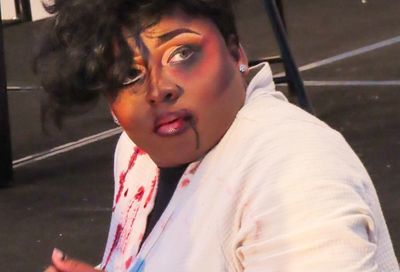Obstructed View
Daniel MacIvor may be a clever observer of the world, but in 'A Beautiful View,' his characters never truly touch us
At the risk of being an uncharitable party-pooper, it must be said that Daniel MacIvor’s A Beautiful View doesn’t quite cut the proverbial mustard. As laudable as it is to explore the underserved subject of latent lesbianism, one cannot applaud MacIvor for, as the saying goes, just turning up. There has to be more, and more there ain’t.
Delivered in the spirit of a good-natured if fusty after-school special for grown-ups, MacIvor, who also directs, gives us Max and Lane, two women who alternately describe, enact, and comment on the progress of their long, often unexplained, barely sexual relationship. Though this storytelling technique ensures periodic breaks in the fiction, it does not impede the rhythm and pace of the piece. We are smoothly and quietly drawn into a well-defined and intimate space. And as Shakespeare and many others have shown, a play that addresses and involves the audience can be a tremendous flashpoint for wit and poignancy. However, there must be something at stake for both the audience and the characters.

A Beautiful View
The problem here is that despite the strength of mood and the actors’ keen sense of their characters, in the end MacIvor does nothing more than skim the issues, which also include the dimensions of female friendship and the here-after, among others.
Though we dip in and out of these women’s lives and psyches, we never gain any real knowledge of them. The pathos of their lives is sketched in sparse, often funny domestic details. But MacIvor never connects it to the intricacy of their apparent bond. Between bouts of factual narrative we get scenes that vacillate between cutesy and overly self-conscious. How are we enlightened by being forced to sit through a flashback of Lane and Max performing a bad cover of a Pat Benatar song? What do we learn from seeing that these two women, like teenagers, continue to obsess over a woman neither know? There is need beneath the shallowness and we should have been knee-deep in an exploration of it. Does Lane feed off Max’s need? Does either woman want to know herself?
When MacIvor does try to get ”deep,” instead of real interaction we get dialogue distilled into what can only be termed ”Beckett-speak” — half sentences uttered amongst pauses in which we are meant to insert meaning. It might make everyone feel important, but it delivers nothing. How is it possible that these two women never really talk like real women talk? Why haven’t we been made privy to the conversations they would really have? A moment in which one of the characters yells out her side of an argument alone in the spotlight is one of the best moments of the play. The piece should have started and stayed with that tenor and honesty.
And where is the physical intimacy? In the few thinly drawn moments where the women stare into each other’s eyes or get up close and personal, we are just left thinking, ”Are the actors going to kiss?” instead of feeling any intensity of attraction between the characters. Nudity is not required, but naked emotion is essential if we are to understand why these women fell into each other’s arms.
To Dec. 2
Studio Secondstage
1501 14th St. NW
$30
202-332-3300
www.studiotheatre.org
Still, despite the shortcomings, leads Jennifer Mendenhall as Lane and Kathleen Coons as Max, deliver fine performances. Both believably inhabit their characters as far as they go — Mendenhall as the sanguine, unadorned Max and Coons the neurotic Lane. One can learn a lot from the way Max carries herself, the insistence on that wiry hair shoved behind the ears, her willingness to pronounce on the world. And we can feel Lane’s fragility through her searching eyes and her song of loss. Both nicely describe and exude the ennui of lives dulled by dead-end careers and too many cheap and nasty apartments.
MacIvor is a clever observer of the world — we can only wonder why he left so much out. Locked in such a one-dimensional treatment, his characters can never truly touch us.
Support Metro Weekly’s Journalism
These are challenging times for news organizations. And yet it’s crucial we stay active and provide vital resources and information to both our local readers and the world. So won’t you please take a moment and consider supporting Metro Weekly with a membership? For as little as $5 a month, you can help ensure Metro Weekly magazine and MetroWeekly.com remain free, viable resources as we provide the best, most diverse, culturally-resonant LGBTQ coverage in both the D.C. region and around the world. Memberships come with exclusive perks and discounts, your own personal digital delivery of each week’s magazine (and an archive), access to our Member's Lounge when it launches this fall, and exclusive members-only items like Metro Weekly Membership Mugs and Tote Bags! Check out all our membership levels here and please join us today!



















